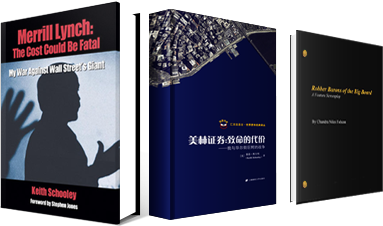![]() The Sunday Ardmoreite
The Sunday Ardmoreite
April 13, 2003
Author speaks on corporate culture of ‘unethical behavior’
By Leah J. Simmons
In the mode of WorldCom’s Cynthia Cooper, Enron’s Sherron Watkins and Coleen Rowley of the FBI, former Merrill Lynch employee Keith Schooley has put his lips together to blow the whistle on what he terms the “corporate culture of unethical behavior” in one of Wall Street’s giants.
…Schooley[‘s]…book, “Merrill Lynch: The Cost Could Be Fatal,”…outlines “lying, cheating and cover-ups” he witnessed during his 15 months of employment as a Merrill Lynch broker in Enid.
Schooley moved from Oklahoma City to Enid in 1991 to work in the Enid Merrill Lynch office in what he assumed would be a “career change and a new opportunity.” What it led to was 10 years of court battles against the company he accuses of a series of wrongdoings.
“Basically, I was certainly under the impression that Merrill Lynch was a company of very high integrity and a company that you could trust and, unfortunately, what I found in my short 15-month employment was a corporate culture of unethical behavior,” Schooley said. “This disturbed me because this is a company that people trust with their money.”
Schooley said after a fashion, “it was hard to turn a blind eye” to such misdeeds as cheating on life insurance examinations and company-wide contests, misrepresentations to clients on investments and failure to deliver on promises. His first effort to address the issues was writing a memorandum.
“I eventually gave my manager a four-page memorandum asking him how a certain 10 different things could be justified because they just weren’t right. And that got faxed to his boss in Oklahoma City and then on up the chain all the way to New York and then New York comes in and does an investigation, but then they proceed to cover up,” Schooley said. “I felt like I was twisting in the wind so I then sent a lengthy letter to the board of directors, bringing to their attention in great detail the cover-up that had been conducted in the first investigation.”
After flying to New York and meeting with some of Merrill Lynch’s top people, Schooley said he returned to Enid, where, “within days, I was terminated.” His dismissal led to years of litigation involving an arbitration panel under the auspices of the New York Stock Exchange. That was followed by further litigation in federal court in Oklahoma City, before the 10th Circuit Court of Appeals, as well as the Oklahoma State Court of Civil Appeals and the Oklahoma State Supreme Court,” he said.
“As you can tell, it was a long journey, and I’ve documented this very well in this book. At least I feel like I’ve made a persuasive case that justice was never arrived at,” Schooley said.
“The book is essentially an indictment of predominantly Merrill Lynch, but also the regulatory system, as well as the ‘judicial system’ available through securities binding arbitration,” he said. “So the book is an indictment of that system and I explain in detail of the flaws in that system.”
Since he got no satisfaction in the legal system, Schooley said he published his book in an attempt to present his case “to the ultimate court in this country which is, in my view, the court of public opinion.”
Schooley said he has already seen backlash where his book is concerned. A booksigning scheduled in February at a well-known Tulsa bookstore was called off after a two-paragraph notice of the event appeared in The Tulsa World.
“The owner of the bookstore called and said he wanted to cancel the signing because he was getting too many complaints from his customers and, as we talked, I found out the customers that he was alluding to were two Merrill Lynch brokers in the Tulsa office, as well as their boss,” Schooley said.
…Well-known Oklahoma attorney Stephen Jones, called the book dangerous because it “names names, takes no prisoners and is explosive.” Also, Schooley said Lloyds of London would not insure the book for media perils coverage.
“That speaks volumes. It’s very controversial,” he said.
The author said the potential is there for retaliation on the behalf of Merrill Lynch, but he believes his cause is worth the chance he took by getting the information to the public.
“I don’t have a clue what Merrill Lynch might do. There are two sides to that coin. They might speak up and fight back or on the other hand, they might decide to not draw attention to it by doing nothing, hoping that it just basically goes away,” Schooley said.
“Fundamentally and bottom line is I know I speak the truth. I’ll just cross that bridge when I come to it.”
